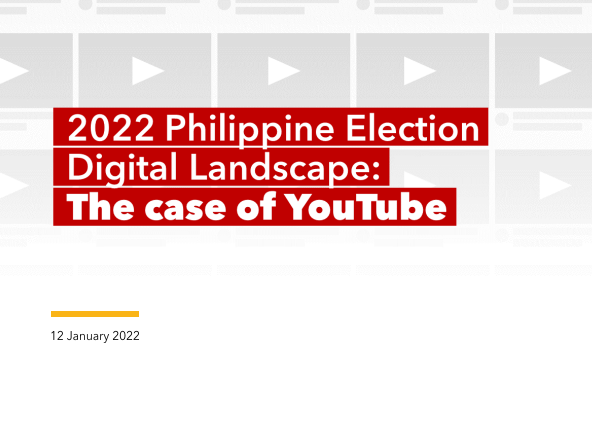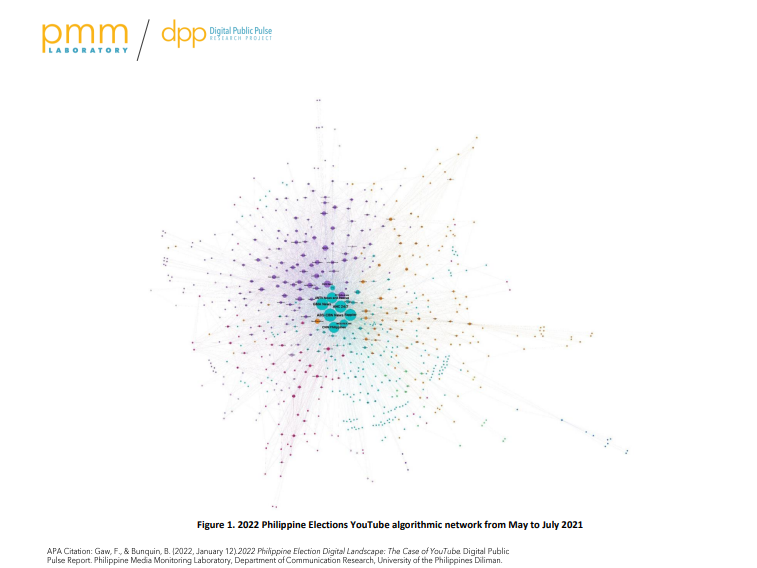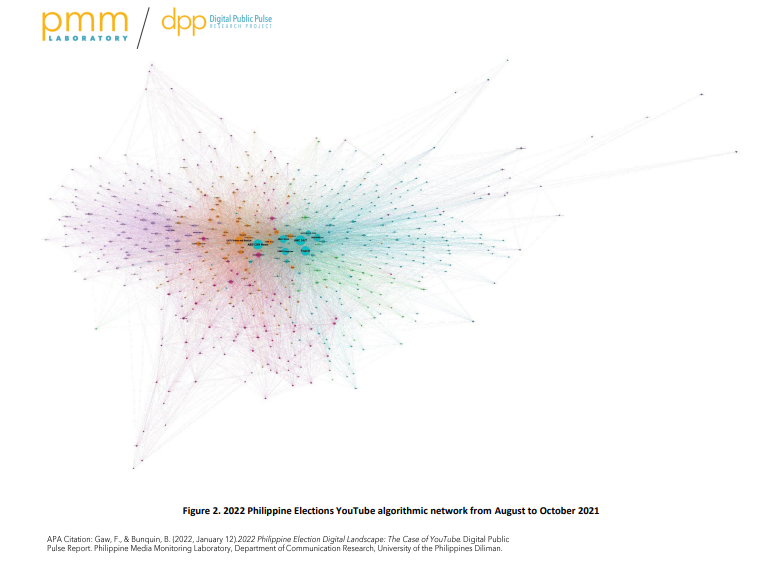
News organizations remain as key sources of information on the upcoming 2022 national elections on YouTube (YT), but a set of media actors are gaining ground, challenging the traditional setup.
This was a finding of a big data study that the Philippine Media Monitoring Lab (PMM Lab) reported on Jan. 12 via Zoom and livestreamed on the PMM Lab Facebook page (https://www.facebook.com/pmm.upcommres). The study is under PMM Lab’s Digital Public Pulse (DPP) project examining “the 2022 Philippine election digital landscape.”
PMM Lab is a consortium of researchers in the fields of communication, political science, and data science.
According to the DPP project findings, “professional news organizations doing general election coverage from May to July 2021 [first quarter of the study] singularly accounted 32 percent of all poll-related talk. However, media sources and channels from the government and religious organizations that are aligned (26%) with or algorithmically linked to (20%) the [Bongbong] Marcos – [Sara] Duterte camps cumulatively comprised an even bigger grouping in YT. Moreover, mainstream entertainment media accounted for 11 percent of the channels engaged in election talk.”
The first set of DPP project findings, covering the period May to October 2021, showed the interactions of YT video providers and the users. However, the “period covered does not include the period when the substitutions and withdrawals were finalized,” said Prof. Fatima I. Gaw, DPP project co-leader. Several withdrawals and substitutions took place until Nov. 15, 2021, the final date for these processes.

The result or findings changed by the second quarter of the study (August to October 2021), when the “community of mainstream news media declined to 28 percent,” as more election networks came into play.
“Channels and personalities identified with the Marcos team diversified into three categories: those politically aligned with President Rodrigo Duterte (14%), those that center their content about dictator Ferdinand Marcos Sr. and his family (13%), and those that promote the presidential tandem of Marcos and Sara Duterte (11%). New groups of actors also emerged in this second quarter of the study: Educational institutions and informational YT channels (19%) and infotainment media and Moreno aligned hyper-partisan content creators (8%),” PMM Lab in a media release said.
The findings were based on an analysis of thousands of digital data points. Using a tool directly linked to the YT Application Programming Interface (API), “a total of 2,057 related and recommended YT channels and their videos were collected from May to October 2021” from a selection of election-related keywords.
“An API was used, instead of a personal account, so that the preference of the person’s history and viewing pattern will not affect the study,” project co-leader Prof. Jon Benedik Bunquin said.
Using an API, the researchers can access and categorize YT videos based on parameters set by the researcher, such as keywords.

According to the DPP project, “These channels were coded into actor categories based on their organizational affiliations, political interests, and content genres. The networks expanded from 650 to 1,407 and their connections from 6,000 to 18,000 between the two quarters.”
“The DPP identifies the dominant personalities, organizations, topics, and issues in the run-up to the elections. Through the use of network maps, DPP depicts the interconnections among various accounts and pages in social media. In so doing, it surfaces potential coordinated messaging and posting, and the role of influencers during the 2022 presidential elections,” PMM Lab in its media release said.
“The DPP also noted mainstream professional media were increasingly becoming detached from the other clusters in the election network, weakening their influence over particular audiences. Instead, it found a strong complementary relationship between ‘official’ media sources and accessible and relatable YT news and political channels, and they make political agenda ‘personal’ and culturally resonant,” PMM Lab added.
According to Prof. Randy Jay C. Solis, chair of the College of Mass Communication Department of Communication Research, “research should not merely be doing research and creating knowledge for knowledge’s sake, but that it should also be relevant, responding to the call of times, as well as practical, enough to incite social change.”On Jan. 26, PMM Lab will release its findings covering the same study period for Twitter and Facebook, respectively. PMM Lab will present its cross-platform analysis on Feb. 2.
